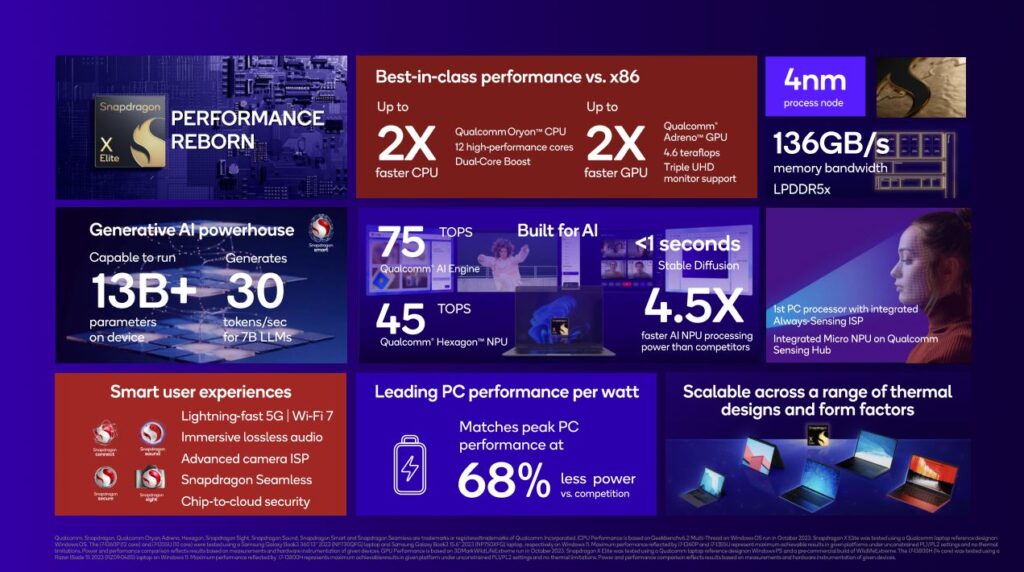In a recent earnings call, Qualcomm’s CEO, Cristiano Amon, made a revelation that sent ripples through the tech community: Microsoft’s next-gen Windows is poised to debut in the middle of 2024. The crux of this announcement was intertwined with the impending launch of the Snapdragon X Elite chip, a cutting-edge piece of technology set to power a new generation of AI-driven laptops, marking a significant leap forward in the era of AI PCs.
The Snapdragon X Elite Chip: Paving the Way for AI-Powered Laptops

Amon’s statement during the earnings call provided a glimpse into the future, stating, “We’re tracking to the launch of products with this chipset tied with the next version of Microsoft Windows that has a lot of the Windows AI capabilities … We’re still maintaining the same date, which is driven by Windows, which is mid-2024, getting ready for back-to-school.” This revelation underscores a closely-knit relationship between Qualcomm’s innovative chip and the release date of the next-generation Windows.
The Snapdragon X Elite chip is not merely a hardware upgrade but a catalyst for a paradigm shift in computing. Its integration with AI-powered laptops signifies a departure from conventional computing models, pushing the boundaries of what’s possible in terms of performance, efficiency, and user experience.
The Nuances of Next-Gen Windows
Amidst the fervent speculations about the nomenclature of the upcoming Windows – Windows 12 or Windows 11 24H2 – a veil of ambiguity hangs over the tech landscape. Current evidence tilts towards Windows 11 24H2, yet the door is not entirely closed on the possibility of Windows 12. The intricacy deepens with the introduction of a groundbreaking platform named Germanium, poised to redefine the very underpinnings of the desktop operating system.
Germanium: The Silent Revolution
Germanium is not a mere iteration or update; it represents a revolutionary platform that aims to redefine the core architecture of the Windows operating system. Beyond the user-facing interface, Germanium introduces profound improvements in performance and security, laying the groundwork for the future of AI-driven computing.
Qualcomm’s Snapdragon X Elite-powered laptops, scheduled for a mid-2024 release, are tangible manifestations of this technological leap. The integration of Germanium with these laptops promises not only enhanced AI capabilities but also a seamless user experience, ushering in a new era of computing.
In essence, the mid-2024 release does not necessarily herald the advent of Windows 12 but signifies the arrival of a new platform – Germanium – regardless of the nomenclature assigned to the user-windoracing Windows iteration. The intricacies of this evolution underscore Microsoft’s commitment to staying at the forefront of technological advancements.
The Timeline
While the specifics regarding the nomenclature remain elusive, the unveiling timeline unfolds in distinct phases. The introduction of Germanium-powered Windows, anticipated in July, is set to grace new laptops, particularly those categorized as AI PCs. However, existing Windows 11 users may need to exercise patience, as the full upgrade rollout is rumored to occur in September, marking a later timeline for the broader user base.
This phased approach aligns with Microsoft’s strategy of introducing cutting-edge technologies to new devices first, ensuring a seamless integration and user experience. The mid-2024 timeline, as indicated by Qualcomm’s CEO, becomes a pivotal moment for both companies, marking the convergence of advanced hardware and software technologies.
The middle of 2024 promises not just a new Windows iteration but a transformative platform, Germanium, that underpins the future of AI-driven computing. Whether it’s Windows 11 24H2 or an unforeseen Windows 12, the amalgamation of Qualcomm’s Snapdragon X Elite chip and Microsoft’s innovative platform sets the stage for a groundbreaking era in the realm of operating systems.



















